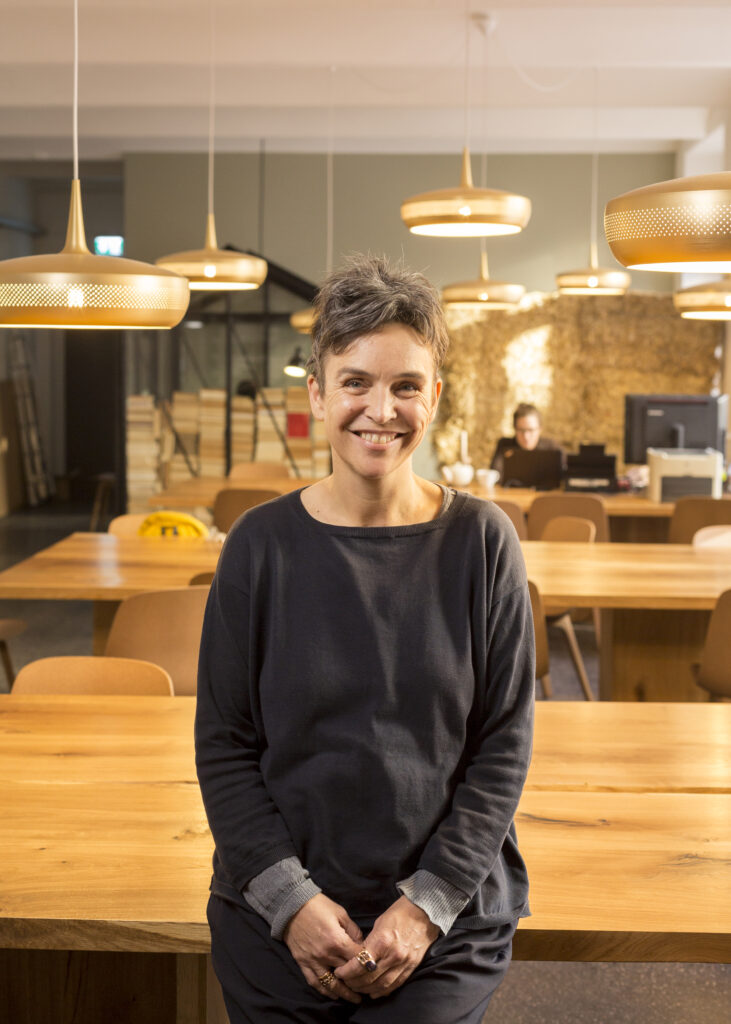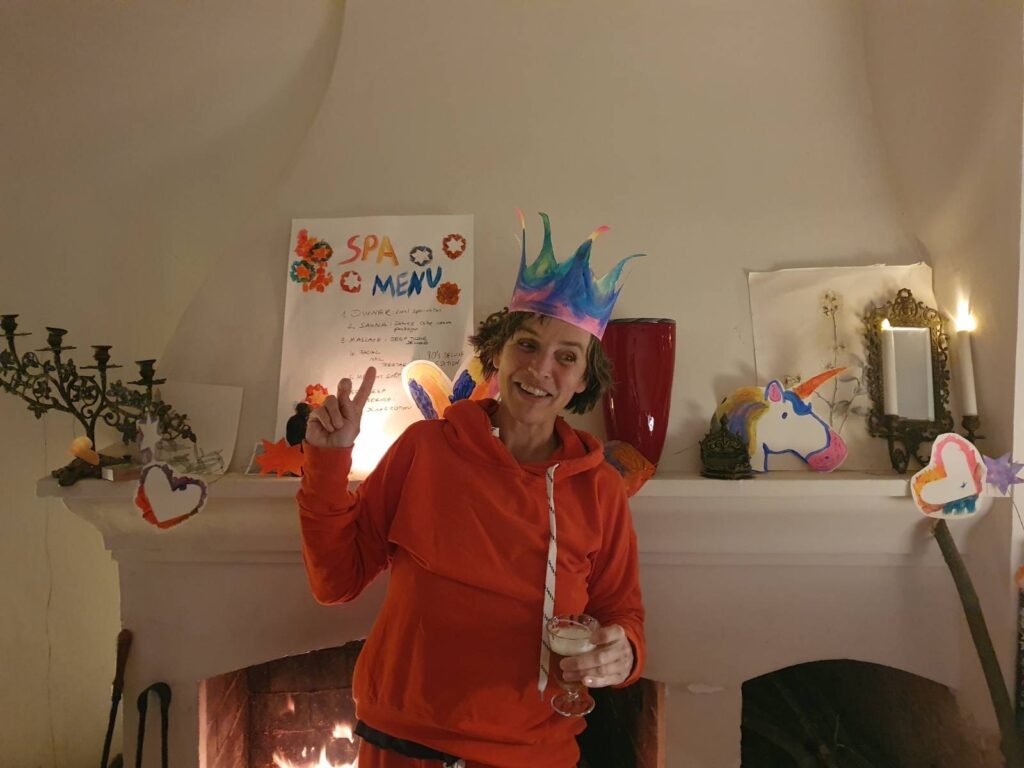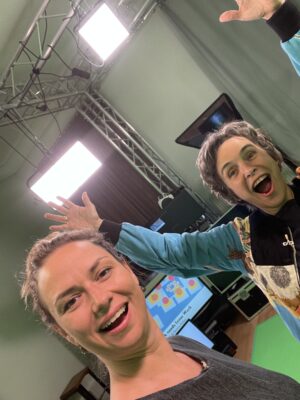Project BFF sat down with Dr. Joana Breidenbach to talk about the friendships in her life.
Project BFF: Tell us a memorable experience with a friend when you were younger. Why has that always stuck with you?
Joana: The first kind of friendships I had with girlfriends when I was in high school actually were very competitive. We were very much a gang of girls, partnering with a gang of boys, and we were constantly competing. It was really an awful climate—we would give each other rankings. In my diary, after school I would write that today Nina, for example, was two minus and that she was awful today. It was a very strange environment.
Then I met a woman who I’m still friends with. We met on a skiing trip when I was 12 or 13. She was completely different from those kinds of friendships because she was really welcoming, open, and curious; she just didn’t have a competitive edge. She had no agenda of her own, she was very receptive. I would say now, for me that was a lifeline in an environment where I had felt very isolated, lonely, and not very happy at my home of origin, which was like a high voltage socket. I was constantly fighting with my mother, and my parents also fought. This friend provided a different kind of climate, she was just such a different energetically, she was so different, and I really could feel that I could exhale. I didn’t constantly have to be guarded, I could just be much more myself. That was really, really nice experience in a time when as a teenager, when we are all concerned with identity.
We are still friends, even though our lives have taken very, very different routes and over the course of our 40-year friendship, our roles have changed. She has had a very difficult life, including losing a child to cystic fibrosis. We both grew up in Hamburg and now we both live in Berlin and we still meet maybe four times a year or so, for walks and talking.
Project BFF: Do you feel like you have a best friend or multiple best friends, and if you do, why would you say that about them? And if you don’t, what do you think is missing?
Joana: Yeah, I would say I definitely had best friends in school. I had a best friend, I had a best friend during my university years. It was always very specific. I mostly had two friends who were very close, and who I would share every intimate detail of my life with.
That has changed quite a bit; my circles of intimacy now are very different. Definitely my most intimate circle is my husband and my two kids. I still have friends from my university days, but I think a really important topic for me is: How do you upgrade friendships? And how do you actually stay in a lively relationship and not in a stale, habitual one? It’s really important for me to have fresh friends who are suitable to the person who I am right now. And I can also say that I think I have outsourced some of my friendship relations to my kids, I am putting some of my friendship needs in my children. I really have to be aware of where I’m doing that and were healthy and where it’s not healthy.
At the moment, I wouldn’t say I have one best friend, but I have a number of people who I am very close to and who I share a lot of life with. Every relationship with them is unique, and there are certain topics which we talk about, they are not exchangeable. There isn’t a circle of friends who I am part of; it’s very one-to-one relationships with individual people.

Project BFF: How do your friends feel about your career? How do they support you and your work?
Joana: My first career was as an anthropologist writing and publishing books and writing, researching. I was a young mother, I had a very fulfilling job, which didn’t pay very well, but I loved. I have a few friends from that time, which is the time when I had young children and we did a lot of trips together. We were a circle of female friends who took our kids to Bali and to Thailand for six weeks during in winter. Those friends actually have not weathered too well.
The next phase of my career, which started when I became a social entrepreneur and being much more visible, is the life of an entrepreneur and the kids leaving home. My own focus of activity shifted, and I’ve actually found that there are a few gaps—it is quite difficult to stay really intimately together with friends who go through very different life processes. Friends who got separated or divorced, and their lives didn’t take such an exciting turn as I would say my own life did. I have conversations with these friends of mine about that and they say, “You put us under so much pressure, you do so much social good, we feel really bad to talk with you about trivialities because you know you always have such a high standard of things.”
There is a mix of, I would say, envy on their part and also of me of being very driven in what I do. And for a number of years being very, very busy and not really resting or really cherishing and putting resources into these kinds of relationships. Some of these friendships, I would say now, which were very close 15 years ago are now a bit casual. We are still in touch, we still do meet each other now and then, but they are not my primary field of resonance when it comes to the issues which I’m involved in right now.
I did form new friendships in that phase where I were with people who are more also living a bit similarly lives; and where it was more on an eye level and I didn’t have to feel so guilty about being successful in some ways. I also felt that they were more interesting, more inspiring than the people who had not really changed that much between their 30s and mid-40s; they just hadn’t gone through or haven’t gone through a similar change process as I have.
There is a part in me where I blame myself. I think in order to form deep new friendships, I also needed to grow personally. I used to be somebody who was very much on the productivity sunshine side of life; and a path to discover more through meditation, other spiritual activities. I did discover more of my own vulnerability and also to be more open with my own anxieties and with difficult stuff. There is part of me that thinks I could have taken some of these friends along better if I hadn’t been so driven. I do think it’s a natural process, if you as a human being changed, it makes sense that I attract and am attracted to different kinds of people with different vibes. I believe that you need to unlearn and let go of some things. I notice how much guilty conscience I have around some of these relationships because they want to see me, and I constantly have to say that I don’t have any time.
I fully accept that there are periods where you as a friend are the giver and other times you receive something. In my case, I have been a giver for quite a long time because I’ve got lots of energy; and there is some competitive advantage in that. I grew up in this mold of being a provider for other people, and it’s difficult for me to ask for help. I think it’s a mix. I was in a pattern which is not so healthy, of not being really able to show myself with all my vulnerabilities to some of these people. At the same time, I do think it’s good to finish things, and have space available for new things that come into your life, into my life, who are more fitting to the kind of person I am right now.
For example, I have two friends I meet every year to go hiking, for the past 20 years, for three to four days in the Alps or France or wherever. They live in the south of Germany, I don’t see them otherwise normally. This kind of friendship is really nice. Even though we are three very different women, we have this commitment to each other that we take time off to really be together and to update each other about our lives and. That is one example where I think I have managed to update existing relationships and to take them on my own ride, or they’ve been able to take me on their ride.
Project BFF: What is the silliest thing you and a friend have ever done together?
Joana: I’m not really a silly person, but I can tell you last week was my birthday. My daughter and two friends created a salon in my home as a gift. I do like comfort, but I’m not the kind of person who uses nail varnish. They had an orchestrated a whole evening—a sauna, deep tissue massage, sitting in front of the fire place watching Legally Blonde, a silly, but quite funny American movie. One of these friends made me a paper crown and they had decorated our house in a really funny way. It wasn’t very me, but I really enjoyed it.

Project BFF: If you could be friends with one famous woman (alive now), who would that be?
Joana: As an anthropologist, I think I would really be interested to take on the shoes of somebody else, and so I would like to go away from the first figures which come to my mind are also like an American pop icon. Laura Nader, she is a professor of anthropology at UC Berkeley and a role model of mind. And she is Ralph Nader’s sister. She is deeply, deeply impressive, and really shaped a lot of who I wanted to be as a young woman.
Project BFF: What advice would you give your 12 year old self about making friends throughout your life? Your 21 year old self?
Joana: There’s one practice which I would like to mention regarding friendship. I’m part of a group of friends, we are three, who have met for 10 years every fortnight. We have a very specific format, we meet for one hour, and we really share very deeply from our physical awareness, our emotional awareness and our cognitive awareness. This is a really rich circle, even though you know, I haven’t thought of them before in our discussion, because I don’t even know what I would call them really, friends.
They are not people who I go out to have a glass of wine with, but these are people who know so much about me. We have a very, very strong confidential container, we share very deep things, and at the same time, we don’t meet outside of this container. This is a really important resource to have, this bit of ritualized space where we give ourselves a lot of space to be very different from what we are normally in our professional lives. We are regionally dispersed. I live in Berlin and another lives in Zurich. We are different ages—40s, 50s and 60s.]
It’s an interesting thing, that I didn’t think about this before. We have such a stereotypical image sometimes of friends of women, friends will hang out together. But with these women it’s a really rich container for sharing, emotional and growing together, really providing a space where we can challenge each other. I think I would have liked to explore different these kinds of really to go out and be more.
That would be my advice for my younger self: To be much more creative and experimental in how to live in friendship. Definitely one other thing would be to show more of my vulnerability, and not be so driven by what others will think of me or how I appear to them.
About Joana
Joana Breidenbach holds a doctorate in cultural anthropology and is the author of numerous books on the cultural consequences of globalization, migration and tourism. Including The Future of Work Needs Inner Work , with Bettina Rollow (pictured with Joana above) , Tanz der Kulturen, Maxikulti, and Seeing Culture Everywhere. Joan is co-founder of betterplace.org and founder of the betterplace lab, where she is responsible for sales, network & inspiration.
Read more about Joana on her homepage and follow her on Instagram.

